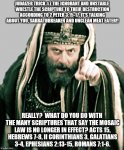[h=2]Obedience—The Test of Love[/h]
Someone may bring up the objection that after the law has accomplished its purpose of pointing the sinner to Christ for cleansing, it will no longer be needed in the experience of the believer. Is that true? No, indeed. The Christian will always need the watchdog of the law to reveal any deviation from the true path and to point him back to the cleansing cross of Jesus. There will never be a time when that mirror of correction will not be needed in the progressive growth experience of the Christian.
Law and grace do not work in competition with each other but in perfect cooperation. The law points out sin, and grace saves from sin. The law is the will of God, and grace is the power to do the will of God. We do not obey the law in order to be saved but because we are saved. A beautiful text which combines the two in their true relationship is Revelation 14:12. “Here is the patience of the saints: here are they that keep the commandments of God, and the faith of Jesus.” What a perfect description of faith and works! And the combination is found in those who are “saints.”
The works of obedience are the real test of love. This is why they are so necessary in the experience of a true believer. “Faith without works is dead” (James 2:20). No man ever won a fair maiden’s heart by words alone. Had there been no flowers, no acts of devotion, no gifts of love, most men would still be searching for a companion. Jesus said, “Not every one that saith unto me, Lord, Lord, shall enter into the kingdom of heaven; but he that doeth the will of my Father which is in heaven” (Matthew 7:21).
Words and profession are not enough. The true evidence is obedience. Today’s bumper stickers reflect a shallow concept of love. They say, “Smile if you love Jesus,” “Honk if you love Jesus”; but what did the Master Himself say? He said, “If ye love me, keep my commandments” (John 14:15). And that is exactly what most people don’t want to do. If love makes no demands beyond a smile or wave, then it is welcome; but if the lifestyle must be disturbed, the majority will reject it. Unfortunately, most people today are not looking for truth. They are looking for a smooth, easy, comfortable religion that will allow them to live the way they please and still give assurance of salvation. There is indeed no true religion that can do that for them.
One of the strongest texts in the Bible on this subject is found in 1 John 2:4. “He that saith, I know him, and keepeth not his commandments, is a liar, and the truth is not in him.” John could write that with such assurance because it is one of the most deeply established truths in the Bible. Jesus spoke of those who said, “Lord, Lord,” but did not do the will of the Father. Then He described many who would seek entrance to the kingdom claiming to be workers of miracles in the name of Christ. But He would sorrowfully have to say, “I never knew you: depart from me” (Matthew 7:21–23). You see, to know Christ is to love Him, and to love Him is to obey Him. The valid assumption of the Bible writers is very clear and simple: If one is not obeying Christ, he does not love Christ. And if he doesn’t love the Master, then he doesn’t know Him. John assured us, “And this is life eternal, that they might know thee the only true God, and Jesus Christ, whom thou hast sent” (John 17:3). Thus, we can see how knowing and loving and obeying are all tied closely together and are absolutely inseparable in the life of God’s faithful people. The beloved John summed it up in these words: “For this is the love of God, that we keep his commandments: and his commandments are not grievous” (1 John 5:3).
Someone may bring up the objection that after the law has accomplished its purpose of pointing the sinner to Christ for cleansing, it will no longer be needed in the experience of the believer. Is that true? No, indeed. The Christian will always need the watchdog of the law to reveal any deviation from the true path and to point him back to the cleansing cross of Jesus. There will never be a time when that mirror of correction will not be needed in the progressive growth experience of the Christian.
Law and grace do not work in competition with each other but in perfect cooperation. The law points out sin, and grace saves from sin. The law is the will of God, and grace is the power to do the will of God. We do not obey the law in order to be saved but because we are saved. A beautiful text which combines the two in their true relationship is Revelation 14:12. “Here is the patience of the saints: here are they that keep the commandments of God, and the faith of Jesus.” What a perfect description of faith and works! And the combination is found in those who are “saints.”
The works of obedience are the real test of love. This is why they are so necessary in the experience of a true believer. “Faith without works is dead” (James 2:20). No man ever won a fair maiden’s heart by words alone. Had there been no flowers, no acts of devotion, no gifts of love, most men would still be searching for a companion. Jesus said, “Not every one that saith unto me, Lord, Lord, shall enter into the kingdom of heaven; but he that doeth the will of my Father which is in heaven” (Matthew 7:21).
Words and profession are not enough. The true evidence is obedience. Today’s bumper stickers reflect a shallow concept of love. They say, “Smile if you love Jesus,” “Honk if you love Jesus”; but what did the Master Himself say? He said, “If ye love me, keep my commandments” (John 14:15). And that is exactly what most people don’t want to do. If love makes no demands beyond a smile or wave, then it is welcome; but if the lifestyle must be disturbed, the majority will reject it. Unfortunately, most people today are not looking for truth. They are looking for a smooth, easy, comfortable religion that will allow them to live the way they please and still give assurance of salvation. There is indeed no true religion that can do that for them.
One of the strongest texts in the Bible on this subject is found in 1 John 2:4. “He that saith, I know him, and keepeth not his commandments, is a liar, and the truth is not in him.” John could write that with such assurance because it is one of the most deeply established truths in the Bible. Jesus spoke of those who said, “Lord, Lord,” but did not do the will of the Father. Then He described many who would seek entrance to the kingdom claiming to be workers of miracles in the name of Christ. But He would sorrowfully have to say, “I never knew you: depart from me” (Matthew 7:21–23). You see, to know Christ is to love Him, and to love Him is to obey Him. The valid assumption of the Bible writers is very clear and simple: If one is not obeying Christ, he does not love Christ. And if he doesn’t love the Master, then he doesn’t know Him. John assured us, “And this is life eternal, that they might know thee the only true God, and Jesus Christ, whom thou hast sent” (John 17:3). Thus, we can see how knowing and loving and obeying are all tied closely together and are absolutely inseparable in the life of God’s faithful people. The beloved John summed it up in these words: “For this is the love of God, that we keep his commandments: and his commandments are not grievous” (1 John 5:3).



